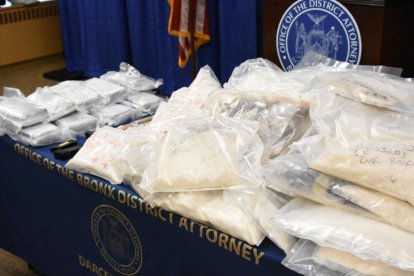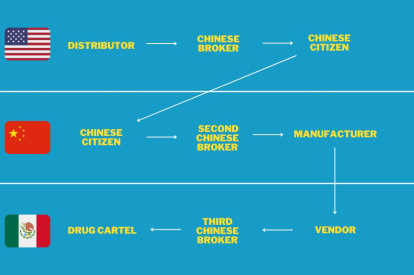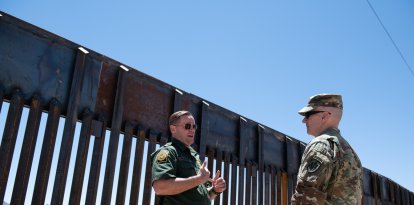The fentanyl triangle: the Mexico-China relationship threatening the U.S.
Drug trafficking experts claim that Chinas' banking system and criminal organizations are essential in laundering money for Mexican cartels.

(DEA)
Needless to say, China does not lie between the United States and Mexico. Despite the 7,000 miles that separate them, in the last decade the Asian country has become a key intermediary in the trafficking of fentanyl and other drugs to the United States.
"Chinese banks are processing tens of millions of dollars in transactions for drug traffickers," explained Foundation for Defense of Democracies Director Anthony Ruggiero to the Congressional Subcommittee on Health and Financial Services.
The paper trail
To understand how Chinese organizations operate, its necessary to follow the paper trail. Former DEA agent Christopher Urben explains that in the United States, every day, there are drug distributors receiving money from American customers.
Those distributors give part of their profits to Chinese brokers, who sell these U.S. dollars to Chinese customers in need of local currency for spending in North America, for everything from paying college tuition to buying property or gambling.
"The Chinese costumers pay in China for the cash they recieve in the United States," the expert said. In this way, the money enters the Chinese banking system. Chinese launderers then use these funds to obtain "goods to export to Mexico or South America.”
These products are then transported and sold by Chinese intermediaries located in Mexico. Once they have the pesos, the Mexican currency, these middlemen pay the drug gangs.

@CmdtPoliciaEc (35)
Graph of the laundering system by Chinese intermediaries / (Voice Media)
What are the advantages?
Mexican cartels previously relied primarily on the black market to exchange pesos.
According to Urben, it was a "complex and dangerous" system that resulted in a loss of 7-10% of the money for these criminal gangs, and there were delays of a week or more. "Chinese crime organizations charge only 1 to 2% to launder," the expert said. In addition, traffickers can receive the funds immediately and in their country of origin.
The black market peso exchange represented a high risk because the traffickers themselves were directly involved in the laundering process. Thanks to Chinese intermediaries, the cartels delegate all laundering operations and deal only with the production and transport.
Why is it so effective?
There is no international movement of funds. Dollars do not leave from the United States, nor pesos from Mexico, nor yuan from China. This "minimizes the movement of funds," in Urben's words.
Furthermore, the former agent adds that this system "takes advantage of increasing volume of trade with China and the existance of capital flight control.” As there is more Chinese activity in the United States, but Chinese regulations make it difficult to obtain dollars, these criminal organizations are assured there is "a constant stream of customers for this funds."
WeTraffic
The social network WeChat is essential for these operations. Foreign launderers use it both to advertise their services and to contact clients, according to the experts. As it is an encrypted network, it is difficult for U.S. security forces to access these conversations.
The Chinese Communist Party, however, does allegedly have access to these chats. According to various reports, including an analysis by The Citizen Lab and user complaints on other social media platforms, Chinese surveillance monitors and censors activity on WeChat.
For this reason, as reported by ProPublica, there are American authorities who accuse Beijing of being aware of how this money laundering works.
China denies everything, U.S. tries to act
Money laundering is not the only way the world's most populous country participates in drug trafficking. In April, the Justice Department filed charges against Chinese laboratories manufacturing fentanyl ingredients. They are transported from Asia to Mexico, where the drugs are manufactured. Even there, in the Americas, there are Chinese chemists collaborating with Mexican organizations, according to Hudson Institute researcher David Asher.
Despite this, Xi Jinping's government is shrugging off the issue. "The root cause of overdose lies in the U.S. itself, and the problem is completely made in the U.S.," Chinese foreign spokesman Mao Ning said in response to a request from the Mexican president. In addition, he maintained that his country has already imposed effective measures against fentanyl-related substances.
"The administration should not shy away from specifically naming China's role in money laundering," argued Anthony Ruggiero, director of the Foundation for Defense of Democracies. He also pointed out that while the United States is fighting production and transport with measures such as presenting criminal charges against the Sinaloa Cartel, so far it has not taken any action against financial institutions involved in the laundering, including "the largest banks in China.”
In addition, the Chinese government itself might have have to appear in U.S. courts. Last Thursday, Republican Senator Lance Gooden introduced a bill that would allow civilians to sue individuals, entities or countries that contribute to fentanyl trafficking.
If the Illicit Fentanyl Sponsor Justice Bill of 2023 becomes law, Americans affected by this crisis will be able to sue China.
Bill Text Justice Against Sponsors of Illicit Fentanyl Act 1 by Santiago Adolfo Ospital on Scribd
RECOMMENDATION





















